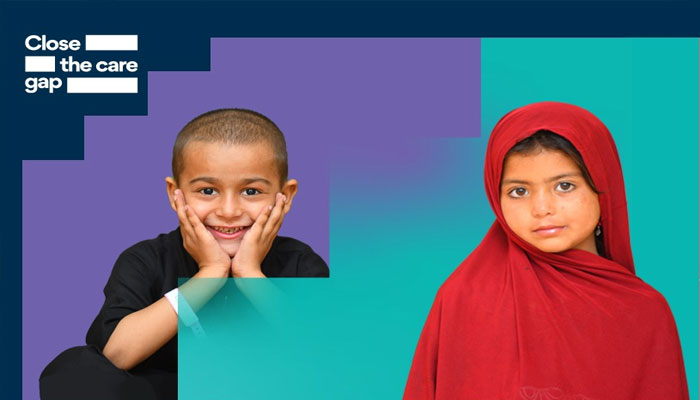World Cancer Day: 180,000 new cancer cases in Pakistan every year
LAHORE : The World Cancer Day, led by the Union for International Cancer Control (UICC), aims to mobilise urgent action to improve cancer risk awareness as well as prevention, treatment and care services for all individuals, regardless of who they are and where they live.
To mark the third year of the ‘Close the Care Gap’ campaign, which highlights the significant inequities that persist across the globe in the availability of and access to essential cancer services, UICC has released the World Cancer Day 2024 Equity Report.
The report provides local perspectives and experiences on inequities in cancer care in regions around the world, notably in low-resource settings such as Pakistan, as well as expert recommendations on how to address them.
“It is estimated that every year, nearly 180,000 new cancer cases occur in Pakistan. There is a need to improve healthcare infrastructure in the country to enable timely diagnosis and comprehensive treatment for these individuals. Shaukat Khanum Memorial Cancer Hospital and Research Centre (SKMCH & RC) has provided access to high quality cancer care since 1994 – by providing free of charge treatment to over 75% of the cancer patients seen at the institution which has campuses in Lahore and Peshawar.
A third hospital being built in Karachi will further help close the cancer care gap in the region. All of us, individuals, healthcare professionals, organisations, or policy-makers can support our efforts to make cancer care accessible for all those who need it, regardless of who they are or where they live.” – Dr Faisal Sultan, CEO of SKMCH&RC UICC provides in the report nine general recommendations to governments to bridge the cancer care gap. Particularly relevant for Pakistan is strengthening population-based cancer registries, implementing an effective national cancer strategy, enhancing health literacy and education around cancer, and developing context-specific and resource-appropriate screening and early-diagnosis programmes. “UICC’s World Cancer Day Equity Report shines a light on the barriers to care and significant disparities in outcomes due to prejudices and assumptions based on socioeconomic status, gender and other cultural norms, race and ethnicity, age, geographical location, sexual orientation and disability. More importantly, it provides local insights into the challenges we face in diverse regions, guiding us toward targeted solutions” – Prof. Jeff Dunn, AO, President of the Union for International Cancer Control To further mark the final year of the Close the Care Gap campaign, UICC is mobilising a global call to action that echoes the sentiments and recommendations expressed in the World Cancer Day Equity Report.
UICC is encouraging all health organisations and to sign the call to action, informing their respective Ministry of Health of the need to close the care gap and recommended actions that can help do so.
“We need to develop an effective national cancer strategy for prevention and treatment of cancer in Pakistan. It should be based on an evidence-based assessment of the countrywide cancer burden, addressing specific barriers faced by our population. With Shaukat Khanum Hospitals, we have developed a model of best practices and demonstrated that we can deliver quality cancer care even in a country like ours with limited resources. Excellence in cancer care for the needy is challenging but not impossible. Similarly, we need to develop context-specific early diagnosis programmes. Early detection of cancers can lead to treatment that is more successful and reduces cost to the health system.
Dr Aasim Yusuf, Chief Medical Officer of SKMCH & RC said such programmes also require effective monitoring, which requires us to strengthen population-based cancer registries. All these measures can help lower barriers to early detection and treatment of cancer in a timely manner.”
-
 'Bridgerton' Season 4: Showrunner Talks About Violet's Steamy Romance
'Bridgerton' Season 4: Showrunner Talks About Violet's Steamy Romance -
 John Tesh Recalls ‘uncomfortable’ Backlash Over ’70s Romance With Oprah Winfrey
John Tesh Recalls ‘uncomfortable’ Backlash Over ’70s Romance With Oprah Winfrey -
 Meghan Markle, Prince Harry Problem Was Not ‘work’ During Time With Royals
Meghan Markle, Prince Harry Problem Was Not ‘work’ During Time With Royals -
 Meta Strikes Multi-billion-dollar AI Chip Deal With Google: Will The New Collaboration Pay Off?
Meta Strikes Multi-billion-dollar AI Chip Deal With Google: Will The New Collaboration Pay Off? -
 Gracie Abrams Breaks Silence After Losing 2026 BRIT Award
Gracie Abrams Breaks Silence After Losing 2026 BRIT Award -
 Deon Cole Takes Swipe At Nicki Minaj In Mock Prayer During NAACP Image Awards Monologue
Deon Cole Takes Swipe At Nicki Minaj In Mock Prayer During NAACP Image Awards Monologue -
 Jennifer Garner Reveals The Actress Who 'carried Through Things'
Jennifer Garner Reveals The Actress Who 'carried Through Things' -
 Shamed Andrew ‘awful’ Time As Trade Envoy Is Laid Bare By Insider
Shamed Andrew ‘awful’ Time As Trade Envoy Is Laid Bare By Insider -
 Belgium Seizes Suspected Russian Shadow Fleet Tanker
Belgium Seizes Suspected Russian Shadow Fleet Tanker -
 Liza Minelli Makes Bombshell Claim About Late Mother Judy Garland’s Struggle With Drugs
Liza Minelli Makes Bombshell Claim About Late Mother Judy Garland’s Struggle With Drugs -
 Shipping Giant Maersk Halts Suez Canal, Bab El-Mandeb Sailings Amid Escalating Conflict
Shipping Giant Maersk Halts Suez Canal, Bab El-Mandeb Sailings Amid Escalating Conflict -
 Matthew McCoughaney Reveals One 'gift' He Achieved With Losing Nearly 50 Pounds
Matthew McCoughaney Reveals One 'gift' He Achieved With Losing Nearly 50 Pounds -
 'Scream 7' Breaks Box Office Record Of Slasher Franchise: 'We Are Grateful'
'Scream 7' Breaks Box Office Record Of Slasher Franchise: 'We Are Grateful' -
 Bolivian Military Plane Crash Death Toll Rises To 20
Bolivian Military Plane Crash Death Toll Rises To 20 -
 'Sinners' Star Blasts Major Media Company For 2026 BAFTAs Incident
'Sinners' Star Blasts Major Media Company For 2026 BAFTAs Incident -
 Inside Scooter Braun, Sydney Sweeney's Plans To Settle Down, Have A Baby
Inside Scooter Braun, Sydney Sweeney's Plans To Settle Down, Have A Baby




